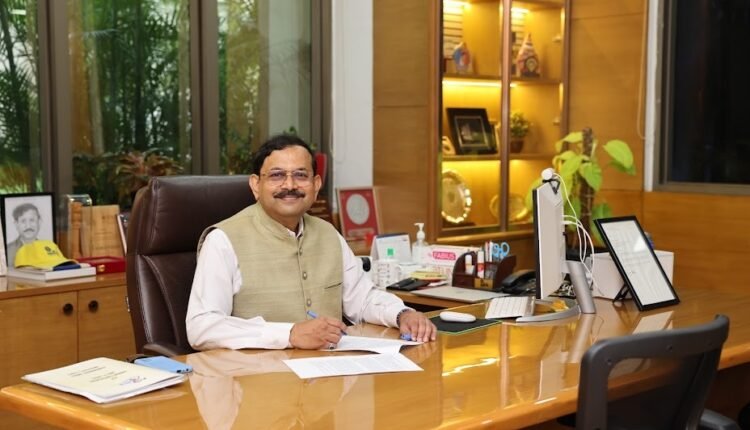INTERVIEW | Empower students to become problem-solving champions, says IIIT-Bangalore Director
Bhubaneswar: The educational institutions in the country are in dire need to evaluate why they are unable to produce quality research, innovation and get patents. “Most of our universities are severely compromised due to insufficient research culture and ecosystem. There are many R&D Labs, some very good academic institutions, industries and their experts could help develop a culture of innovation and research among students,” said Director of IIIT-B Prof. Debabrata Das, while stressing on industry-academia collaborations.
In an exclusive interview with The Dinalipi, Prof. Das said that, “While western countries have less population and more innovations, Indian universities fall short in this direction. We need to shift from a service–oriented mindset to more problem-solving product innovations on the academic campus. Even though the IT and semi-conductor industries were flourished in India, now it’s time to focus on new products, by igniting young minds towards innovations. From the 3rd or 4th year of BTech or MTech or PhD education, technical students along with teachers should delve into innovations and research, which will lead to development of new products. And higher education institutes must encourage patent filing to protect Intellectual Property Rights (IPR) before communicating a good paper, which will help to keep the IPR in our country.”
In this dynamic landscape of the 21st century, the amalgamation of technology, business, and society presents unprecedented challenges as well as opportunities. To address and tackle these intricacies, universities are stepping up, with innovation centres of excellence are surfacing as vital hubs for honing future champions. Amongst all these, the International Institute of Information Technology, Bangalore (IIIT-B) stays ahead of the curve as a beacon of excellence, providing students with deeper knowledge, hi-tech tools, and impeccable experiences essential to map out the pressing issues of our time. The products like MOSIP, OpenG2P, etc from IIIT-B are now in 23+ countries of the world.
Established in 1998, IIIT-Bangalore offers nine programmes and has 4 centres of excellence on digital public infrastructure. Having student strength of 1500+, it aims to reach 3000+ milestone in next 6 years. While the deemed to be university has received Rs 102 crore from different parts of the world for R&D in the last fiscal year, 51 research projects are undergoing at the institute. Out of 32 IIITs in the country, IIIT-B is the second-best institution among the IIITs as per NIRF ranking, solidifying its status as a leading institution in the area of IT education.
Tele-mental health initiative with NIMHANS
In 2022-23, IIIT-Bangalore joined hands with the National Institute of Mental Health and Neuro Sciences (NIMHANS), Bangalore, with technological support to roll out Tele-Mental health programme across the country. The helpline – 14416 – receives more than 3000 calls daily to provide quality mental health counselling and care services. Union Finance Minister Nirmala Sitharaman in her budget speech had announced the launch of the National Tele-Mental health programme which will include a network of 52 tele-mental health centres of excellence.
MOSIP: Digital Identity
Prof. Das explained the Modular Open Source Identity Platform (MOSIP) developed by IIIT-B with support 5 philanthropy foundations. MOSIP is a robust, scalable and inclusive foundational identity platform backed by Bill and Melinda Gates Foundation (BGMF), Tata Trusts, NORAD, and Pratiksha Trust, which have cumulatively provided Rs 250 crore funding. The platforms helps government and other user organizations implement a digital, foundational identity system in a cost effective way. At present, the product is being implemented in 23 countries for their national identity programme. And plans are afoot to roll out in 40 countries in next 2 years, informed Prof. Das.
Digital Governance & Data Lake
The institute is also closely working with six departments of Karnataka Government as chief technical advisor for e-governance services. IIIT-B will be setting up a ‘Centre for Technology Research and Innovation for Digital Governance (CTRI-DG) headed by Prof. R. Chandrashekar and funded by the Centre for E-Governance (CeG), Government of Karnataka of around Rs 9 crore. In a bid to check policy paralysis, IIIT-B will be setting up a ‘Data Lake’ headed by Prof. Srinath, with funding from the Government of Karnataka for supporting data driven planning. The initiative has been approved at a cost of Rs 9.8 crore by the Planning Department with technical support from the Centre for Open Data Research and IIIT-B to help in policy making, he said.
IIC Scripts Success
Set up in 10 years back, the IIIT-B Incubation Centre (IIC) has become a breeding ground for idea incubation and start-ups. As many as 64 start-ups have been formed with the seed money provided by the Government of India and a few multinational companies. There are 3 types of start-ups at IIITB – student-oriented, faculty-oriented and external companies collaborating with IIIT-B faculty and students. “We incubate for 2 years and then start-ups are allowed to scale up their business with the products and outside funding,” said Prof. Das.
Private Vs Public Universities
When asked about the performance of public universities at par private institutions, Prof. Das advocated for academia freedom and flexibility as academic institutes should be supported for merit. Then best brains will come to Indian academia in larger number and teach as well as innovate, which will train next generation (like advanced countries). If we want to be advanced country in future, then the state-funded varsities need to build next generation of human capital, where no interference from the Government in decision making of the institution. And the Government should act like a helping hand. So that bright people will come into academic, otherwise brain-drain will continue in the country, he stressed.
NEP-2020
Shedding light on the National Education Policy-2020, Prof. Das said the academic institutions in the country will witness a big transformation in near future as the policy gives stress more towards hands-on training and skill development for students. Due to its inclusivity, flexibility, adaptability and inter-disciplinary nature, the policy will go a long way in shaping the young minds and creating quality human capital of the country, he added.
After serving the IIIT-Bangalore as professor for 23 years, Prof. Debabrata Das who belongs to Odisha’s Cuttack is currently leading the tech-school as Director.






Comments are closed, but trackbacks and pingbacks are open.